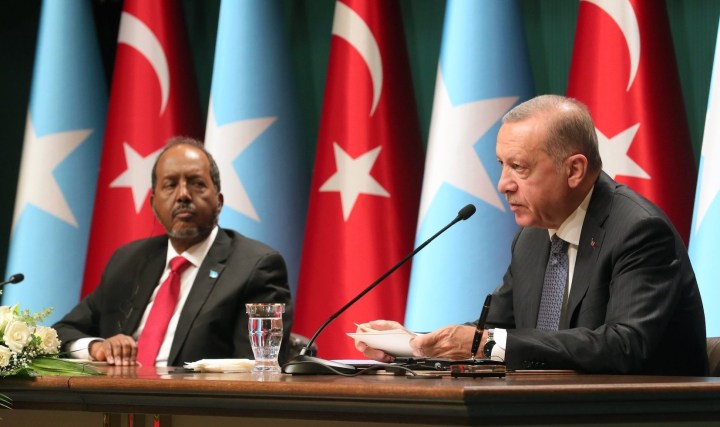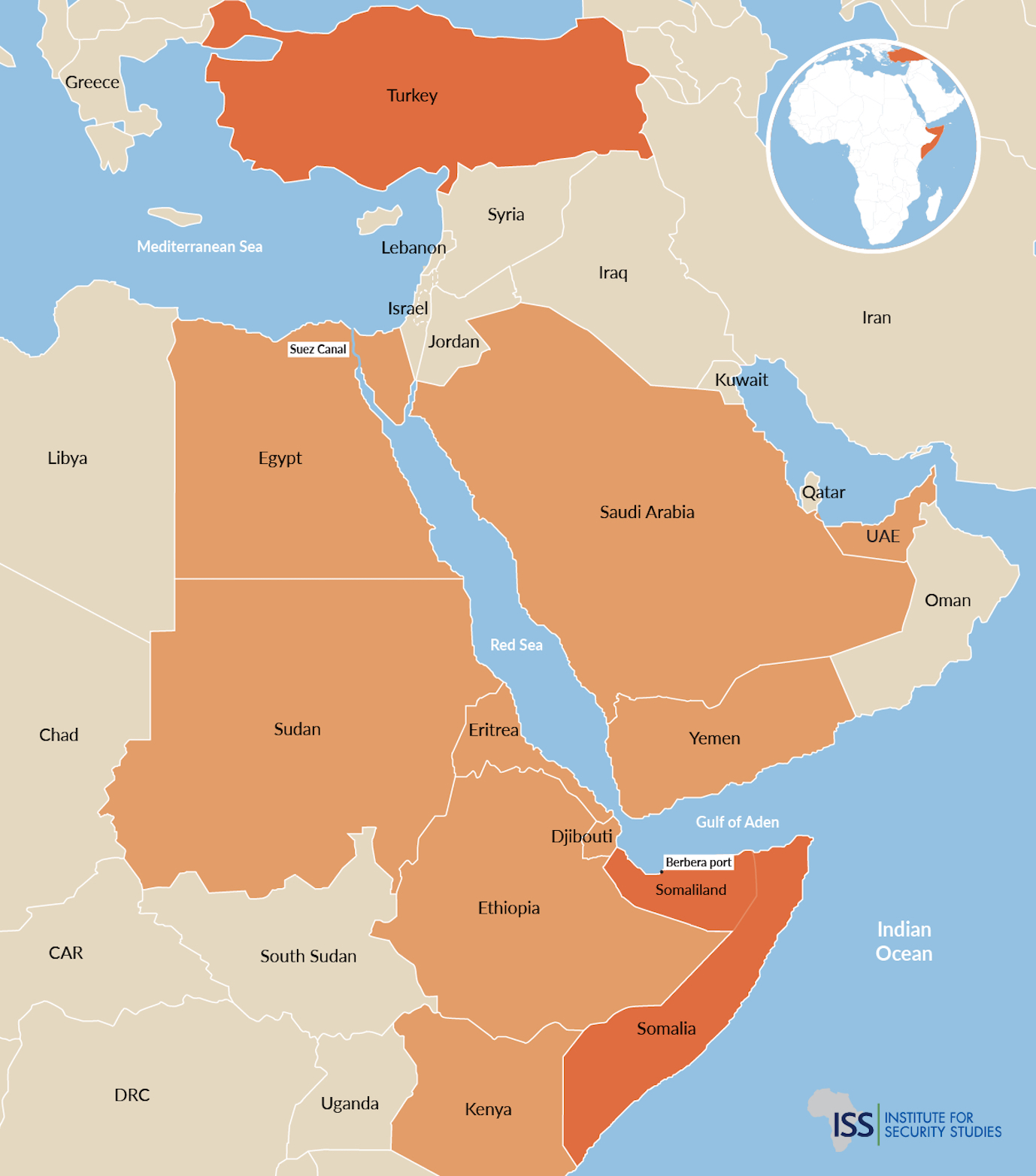ISS TODAY OP-ED
Somalia-Turkey maritime security partnership faces stormy waters

Somalia is leveraging untapped maritime incentives to build alliances in a turbulent region.
Somalia and Turkey have forged a new defence and economic partnership. The agreement is one part of an intricate web of maritime pacts involving Somali sovereign rights, and signals maritime governance’s growing role in regional peace and security.
On the surface, the agreement expands Turkey’s existing support to Somalia for humanitarian aid, famine relief and infrastructure development. It splits the revenue from activities in Somalia’s exclusive economic zone – giving Turkey a 30% share of marine revenue in return for bolstering Somalia’s maritime security capabilities through training, joint operations, information sharing and naval acquisitions.
Stronger maritime security institutions and capacity are paramount for Somalia, given its location astride globally strategic shipping lanes bordering the Gulf of Aden and Indian Ocean. The African Union Transition Mission in Somalia has helped maintain a degree of stability in the country, but maritime security was an enduring gap in its mandate. Other capacity-building initiatives, such as those by the European Union and United Nations agencies, have tried to fill that gap.
Horn of Africa, Arabian Peninsula and Turkey

Maritime resources matter. Somalia’s extensive coastline – the second-longest of any African country – entitles it to a vast exclusive economic zone that harbours significant marine life, and could contain considerable hydrocarbon resources. That makes it a focal point for several countries and companies hoping to sign lucrative agreements for exploration and prospecting.
Transparency in the Somalia-Turkey deal is essential, especially regarding several details of the revenue calculation and cost-sharing mechanisms.
First, depending on the revenue-sharing arrangement, Turkish oil and gas exploration companies might get access at a reduced cost compared with standard licensing agreements for non-Turkish entities. That would reduce some of Turkey’s upfront financial risks and burdens associated with buying foreign offshore exploration and extraction rights. It implies that Turkey’s activities under the agreement are partially compensated through revenue generated from marine activities.
A 30% saving is not to be sniffed at, especially in areas affected by piracy, hijacking and kidnapping for ransom. If that means Somalia makes 30% less tax revenue from licensing fees in exchange for enhanced maritime security capabilities, the deal could be worthwhile.
Second, does the agreement mean Turkey benefits not only from its own exploration and extraction activities in Somalia’s exclusive economic zone, but also from the activities of licensed third parties? Somalia recently adopted legislation to govern its offshore maritime areas and has entered into several agreements.
Finally, because the deal with Turkey is anchored in development, it should align with Somalia’s broader goals to uplift communities and the country. Somalia’s government must ensure that local communities aren’t marginalised and that any maritime benefits are shared. Historically, a root cause of Somali piracy was coastal communities’ grievances over illegal fishing by foreign vessels and environmental degradation.
Pragmatic and political motives
Besides its financial and legal aspects, the agreement could also disrupt the balance of power in the Horn. Somalia has pragmatic and political motives for partnering with Turkey – and wants to show the region it can engage with international partners, arguably to counterbalance Ethiopian influence.
Sovereignty lies at the heart of controversies over the recent Ethiopia-Somaliland agreement, which would grant Ethiopia access to Somaliland’s Berbera Port for commercial marine operations. Ethiopia’s potential recognition of the self-declared independent region of Somaliland as part of the port accord could significantly affect the region’s stability.
While the Ethiopia-Somaliland deal seeks to enhance Ethiopia’s strategic and economic access to the sea, and secure alternative routes to Djibouti’s port, the Somalia-Turkey agreement helps to preserve Somalia’s sovereignty against what it sees as encroachment.
Somalia takes sovereignty seriously and has shown a willingness to escalate disputes involving its sovereign rights regarding maritime territory. Sovereignty lay at the heart of the maritime boundary dispute between Somalia and Kenya ruled on by the International Court of Justice (ICJ) in 2021. This disagreement was triggered mainly by the desire to own ocean zones where lucrative oil blocks could be auctioned off for exploration.
Both countries referred to the zones in terms of territory and sovereignty. This made resolution difficult, as both felt threatened by the prospect of the other gaining at their expense. The ICJ’s decision established a new border that maintained part of the contested area under Kenya’s control, while granting a significant portion to Somalia.
The Somalia-Turkey agreement could also influence the functioning and power dynamics within the African Union, East African Community (which Somalia joined in December 2023) and Intergovernmental Authority on Development. As these regional bodies strive to enhance cooperation and resolve disputes, bilateral maritime security agreements could complicate their work.
Any decisions on maritime security and the use of ports have implications that extend beyond a single state. Global and regional powers have vied for influence in the Horn of Africa for centuries, and especially since the Red Sea passage to and from the Suez Canal became a chokepoint for the global economy. The interdependence created by the political geography of the Horn makes regional cooperation and coordinated policies vital.
For Somalia, the Turkey partnership reflects a strategic calculus aimed at enhancing Somalia’s sovereignty and development, navigating the Horn’s intricate power dynamics and building much-needed maritime security capacity. However, these gains stand to be achieved through a revenue-sharing agreement that may aggravate coastal community grievances.
As domestic and external maritime security interests bring about major shifts in the Horn’s power dynamics, the implications are in all of Africa’s interests. DM
Timothy Walker, Maritime Project Leader and Senior Researcher, Institute for Security Studies (ISS) Pretoria.
First published by ISS Today.






 Become an Insider
Become an Insider
Comments - Please login in order to comment.